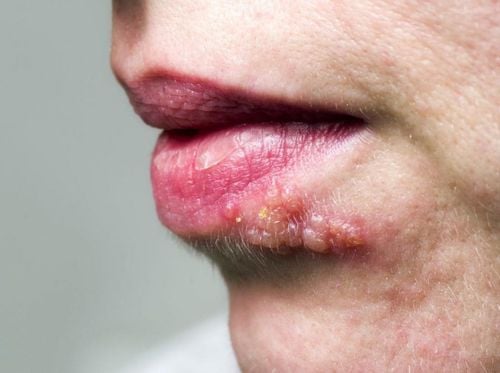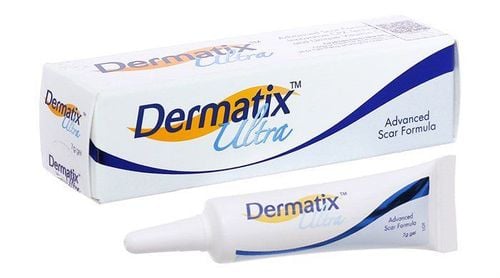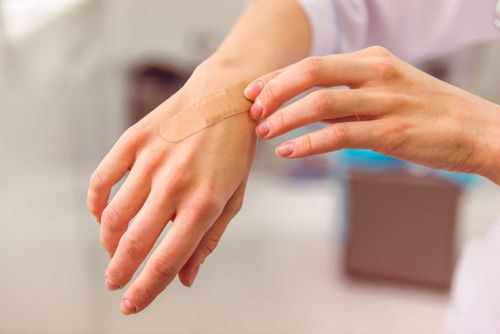The article is professionally advised by Huỳnh Thoại Loan, associate professor, PhD, MD, Head of the Pediatric - Neonatal Department at Vinmec Central Park International General Hospital. She is one of the leading pediatric and neonatal specialists in Ho Chi Minh City, with nearly 30 years of experience in diagnosing and treating pediatric endocrine disorders, pediatric nephrology, and other pediatric and neonatal issues.
Chickenpox, characterized by the appearance of erythematous vesicular rash and itchy blisters on the skin, has a high likelihood of leaving scars. In severe cases, areas of skin on the body, particularly the face, may develop pitted or deep scars, which can significantly impact the individual's appearance.
1. Complications of chickenpox
Although chickenpox is a benign disease, it can lead to complications such as:
- Skin infections at the site of the blisters, which can become severe if bacteria enter the bloodstream, leading to sepsis.
- Serious complications like pneumonia, encephalitis… can be life-threatening or cause lasting disabilities.
- Even after recovery, the varicella-zoster virus remains dormant in the nerve ganglia. After many years, when conditions are favorable, the virus may reactivate and cause shingles (herpes zoster).
- For pregnant women, chickenpox can lead to miscarriage or, if contracted during pregnancy, the baby may be born with congenital varicella syndrome. This can result in birth defects such as a small head, limb deformities, congenital scars, cerebral palsy… If the infection occurs around the time of delivery or shortly after birth, the infant may develop severe blistering and is at high risk for pneumonia complications.
2. Does chickenpox leave scars?
One of the complications of chickenpox is scarring. The chickenpox blisters usually appear on areas such as the face, hands, feet, back, chest… In the early days, they often cause a burning sensation and intense itching, and later they dry out, form scabs, and fall off, leaving behind dark spots on the skin.
In some cases, improper care or consumption of certain everyday foods can worsen the skin condition during the illness, leading to scarring. There are many instances where individuals develop hypertrophic or atrophic scars all over their bodies, especially on the face, causing significant emotional distress and self-esteem issues later in life.
3. What should you avoid eating when having chickenpox to prevent scarring?
3.1. Foods to avoid

A proper diet can help people with chickenpox avoid unwanted complications. Therefore, when suffering from chickenpox, patients should avoid the following foods:
- Avoid foods that are high in fat, and those that are too hot or overly nourishing.
- Spicy and hot condiments: Such as ginger, onion, garlic, leek, chili, pepper, fennel, curry, mustard, coriander.
- Types of meat: Goat meat, dog meat, chicken, duck, goose, eel, and seafood (shrimp, crab, clams, snails, etc.).
- Certain fruits and vegetables: Longan, lychee, plums, ripe mangoes, jackfruit, persimmons, cherries, water spinach.
- Fatty foods: Such as chestnuts, roasted peanuts, sunflower seeds, fried peanuts, fried snacks, deep-fried foods, and animal fats.
- Most importantly: Cinnamon bark (Cinnamomum cassia) should be completely avoided, as it has a hot, yang-boosting property, which can overheat the body, excessively dry it, and damage the body’s fluids—this can be very harmful to people with chickenpox.
In addition to avoiding the foods mentioned above, individuals with chickenpox must never squeeze or scratch the blisters. These blisters should be left to dry and naturally peel off. Interfering with them can cause further skin damage, prolonging the healing process, and may even worsen the scarring.
It is advised to minimize the use of soap to scrub the blisters. Instead, use warm water to gently cleanse the body. Only after the crusts have fallen off should you use soap for bathing.
Once the blisters have dried and scabbed over, you should consult with a doctor about the use of scar treatment creams to minimize and improve the appearance of scars. This is the stage when scars are still in the early stages and are much easier to treat. Proper care and application of the cream at this stage can significantly improve the appearance of scars, especially if they are mild.
3.2. Foods to eat
People with chickenpox should consume a light, nutritious diet consisting of easily digestible liquid or semi-liquid foods, such as mung bean porridge, taro and coix seed porridge, taro and young bamboo leaf porridge, brown rice porridge, honeysuckle porridge, millet porridge, mung bean vermicelli porridge, asparagus, eggs, bananas, red beans, green beans, black beans, potatoes, carrots, white radish, winter melon, cleome gynandra, purslane, gotu kola, bitter melon, amaranth, bok choy, cabbage, lettuce, and mugwort.
It is also important to include foods rich in vitamin C such as lemons, oranges, avocados, strawberries, kiwis, pears, watermelons, cucumbers, and tomatoes. Vitamin C helps boost immunity, fight infections, accelerate collagen production, and prevent hypertrophic and atrophic scars.
Ensure adequate fluid intake during this period. In addition to mineral water and fruit juices, bone broth and coconut water are also excellent choices.
4. Treatment and Prevention of Chickenpox

- If you have contracted chickenpox, you should maintain good hygiene by using warm water.
- Avoid close contact with others during the illness, refrain from going to crowded places, and take time off from school or work. Use personal items separately, such as towels, cups, plates, and chopsticks.
- Avoid exposure to wind when infected with chickenpox as it may lead to complications.
- Do not scratch the blisters and wear soft, loose clothing to prevent the clothes from rubbing against and breaking the blisters.
- Do not self-medicate; always consult a specialist before taking any medication.
- If you experience persistent coughing, difficulty breathing, fatigue, high fever, or confusion, seek medical attention immediately.
- To prevent chickenpox, everyone should get vaccinated, especially young children. The chickenpox vaccine is highly effective and long-lasting, helping the body produce antibodies against the chickenpox virus.
The Vaccination and Immunization Clinic at Vinmec International General Hospital is always available to provide the chickenpox vaccine for customers. The vaccines at Vinmec are stored using a cold chain system (cold storage, refrigerators with temperature monitoring devices that alert when temperatures exceed safe limits...). In addition, parents can easily check their child's vaccination history and schedule via computer or mobile phone.
The Importance of Vaccination on Schedule
According to recommendations from health experts, even during disease outbreaks, parents should still ensure their children are vaccinated on time. Delaying vaccination can increase the risk of contracting diseases that have already been eliminated or make infectious diseases, such as flu, measles, chickenpox, sore throat, and pneumonia, more severe and difficult to treat.
In the first five years of life, a child’s immune system is still developing, so timely vaccination is an effective way to strengthen their immune defense. Parents should ensure that, when taking their children for vaccinations, they follow the guidelines provided by the World Health Organization (WHO) and the Ministry of Health, such as wearing masks properly and washing hands frequently with sanitizers. Additionally, parents should stay updated on accurate and complete information regarding COVID-19 to protect themselves and their families from the coronavirus.
Even in areas without active outbreaks, parents can still take their children for vaccinations according to the recommended schedules for their age. However, they should avoid crowded places, make appointments in advance to avoid waiting, and choose a healthcare facility that meets safety and quality standards.
As a key department in Vinmec’s healthcare system, the Pediatrics Department consistently provides high satisfaction for clients and is highly regarded by experts in the field for:
- A team of pediatric specialists: Comprising experts with high levels of professional qualifications (professors, associate professors, doctors, and masters), extensive experience, and backgrounds working in major hospitals like Bach Mai and 108. All doctors are well-trained, professional, and understanding of children's psychology. In addition to domestic pediatric specialists, the department also features international experts from countries like Japan, Singapore, Australia, and the United States, who are always at the forefront of applying the latest and most effective treatment protocols.
- Comprehensive services: In the field of pediatrics, Vinmec provides a full range of healthcare services, including neonatal and pediatric care, vaccinations, and more, all meeting international standards, helping parents take care of their child's health from birth to adulthood.
- Advanced techniques: Vinmec has successfully implemented many advanced techniques to improve the treatment of complex pediatric conditions, such as neurological and cranial surgeries and stem cell transplantation for cancer treatment.
- Professional care: In addition to understanding children's psychology, Vinmec places special emphasis on providing a comfortable and enjoyable environment for children to play, helping them adapt to the hospital environment and cooperate during treatment, thereby enhancing the effectiveness of healthcare.
To arrange an appointment, please call HOTLINE or make your reservation directly HERE. You may also download the MyVinmec app to schedule appointments faster and manage your reservations more conveniently.








